I have a confession to make: I’ve gone through my entire life and never seen a Fellini film. I take great shame in this statement because there’s really no good reason why I’ve avoided Fellini for all these years. I’m into art films and I love David Lynch (who counts Fellini among his influences). I’ve heard his name brought up every time someone discusses the greatest directors of all time. I love foreign films and surrealism. So why haven’t I seen one of his movies before now? The answer: I don’t know.
My best excuse is that his films haven’t been readily available to me throughout my life. It’s not like La Dolce Vita sat on the shelves of Blockbuster Video next to Kindergarten Cop and The Best of Gallagher. For me to have come into contact with a Fellini film, I would have had to buy it on DVD (which can run a good $30 or more for arthouse movies) and hoped that I liked it enough to warrant the price tag. But there’s another reason I’ve avoided his films—a dirtier, more shameful reason. I had heard so much about Fellini and what a genius he was and how 8 1/2 was one of the greatest movies of all time and all that. Being subjected to all of the praise that was bestowed on the director somehow made me resistant to checking out his films—‘Everyone likes him but I’m different. No one could possibly be a better surrealist than David Lynch, especially a stodgy Italian guy who made films in the 50s and 60s.’ I have no idea why I thought he was ‘stodgy’. Occasionally I ascribe characteristics to things that turn out to be highly inaccurate, all based on nothing that exists in reality. We all have our quirky flaws, right? This same train of thought led me to avoid listening to The Beatles until I was in my 30s, and I eventually ended up loving them.
So recently I decided I was going to randomly pick one of the Fellini Films available on the Criterion Channel and talk about it here on 25YL. I picked Juliet of the Spirits because I had never even heard of the movie before. I figured I’d be able to approach it objectively without any preconceived notions about it being The Greatest Film of All Time, and just enjoy it on its own merits.
The Verdict: I absolutely loved this movie! I’ve seen some negative reviews of this film that indicate it’s the beginning of Fellini’s decline as a director. But if this is considered to be his decline, then I can’t wait to see his other ‘great’ movies! Why oh why did I wait so long to watch a Fellini movie?
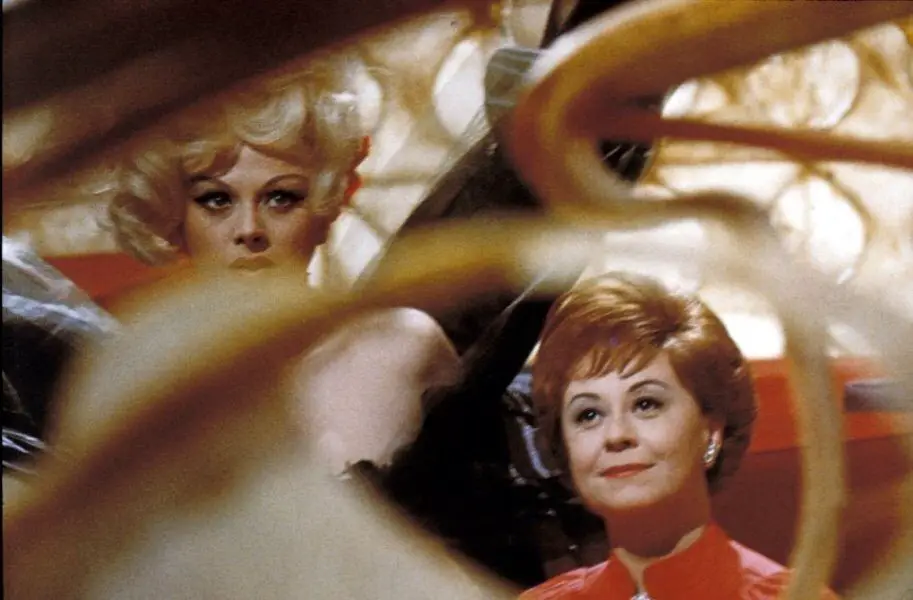
Juliet of the Spirits is the story of Giulietta Boldrini (played by Fellini’s real-life wife Giulietta Masina), a plucky yet rather ordinary housewife who slowly begins to suspect her husband Giorgio (Mario Pisu) of having an affair. She hires a private investigator to follow him around for a week. Meanwhile, she starts spending time with her free-spirited neighbor Suzy (Sandra Milo) and partakes in various forms of mysticism (such as gurus and seances) to find a spiritual center in the midst of her marital dilemma.
It has been said that Fellini intended this film to be a love letter to his wife—his examinations of the feminine side of the emotional spectrum. But I’m not sure exactly what Fellini was trying to say with this story. While the true meaning of the film is certainly open to interpretation, I saw it as simply a kaleidoscopic menagerie of dreams, visions, and memories centering around Giuletta’s life as her marriage crumbles around her.
All of this mental and emotional chaos is presided over by a spirit named Iris. Early in the film, Giulietta and some friends play around with a Ouija board while holding a seance (has messing with a Ouija board ever turned out well in a motion picture?) and Iris attaches herself to Giulietta. Iris guides her throughout the film, whispering to her and leading her through the psychological abyss of grotesque freaks and distorted memories.
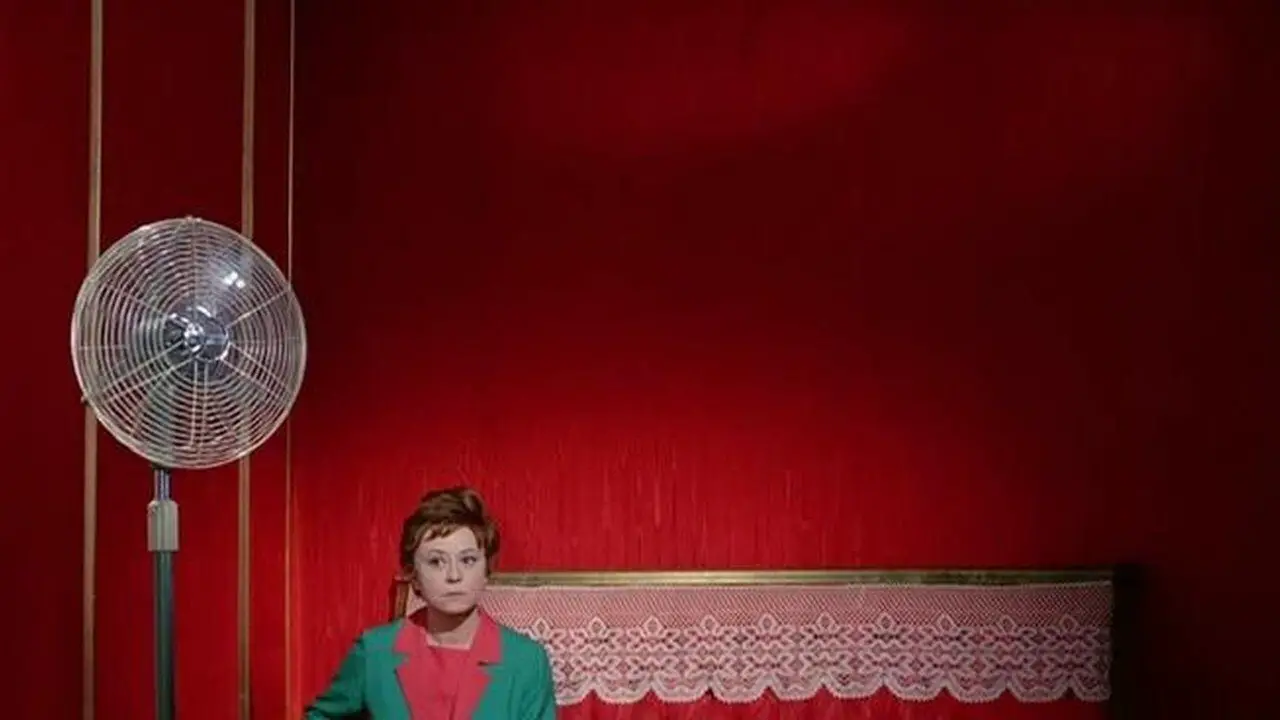
Giulietta attempts to seek answers through various forms of mysticism in this movie. Besides the aforementioned seance, she and her friends attempt a role-playing exercise designed to ‘cleanse the soul,’ and she visits a truly bizarre guru called The Bhisma. The Bhisma is a sort of elderly man/woman who surrounds himself with an entourage of equally bizarre folk, spouting questionable advice to Giulietta. In one of the movie’s oddest and funniest scenes, The Bhisma’s assistants run around the room chirping and growling while he assumes a female voice and upsets Giuletta by telling her that having more sex with her husband is the answer to all of her marital woes.
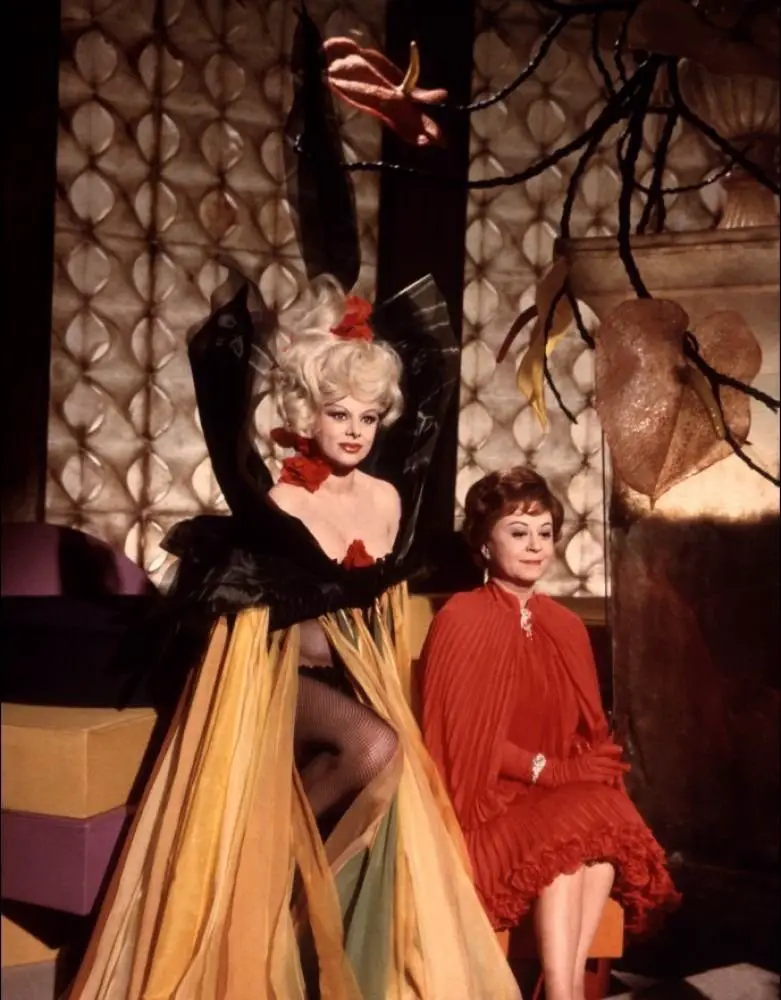
And then there is Giulietta’s outrageous neighbor Suzy. This woman takes pride in being a ‘slut’—she has sex with random men in a treehouse in the woods, a slide leading from her bedroom to a swimming pool, and wild, costumed orgies at her house to rival Z-Man’s from Beyond the Valley of the Dolls. Suzy sets up a sexual encounter between Giulietta and a gorgeous young man at one of the orgies, but Giulietta can’t go through with it. She just runs back to her house and waits for her husband to get home. She knows her husband is out somewhere sleeping with a model, but sitting at home and waiting for him is what she knows. This poor woman is determined to wallow in misery, it seems.
When I watch a surreal film such as this one, I am averse to picking apart the meaning of it. I believe that Juliet of the Spirits could mean a lot of different things to different people. Trying to give a definitive meaning to Giulietta’s visions implies that there is only one way to interpret this story, and I do not believe that to be so. It takes away some of the ‘fun’ of an art film when you feel like there is a proper and academic meaning behind it all. It’s all about what it makes you feel, what it touches deep inside of you, what it unearths inside your soul. That being said, I will give my basic opinions of Giulietta’s visions, because they form the crux of the story (and they are also the best scenes in a film that is chock full of fantastic scenes).
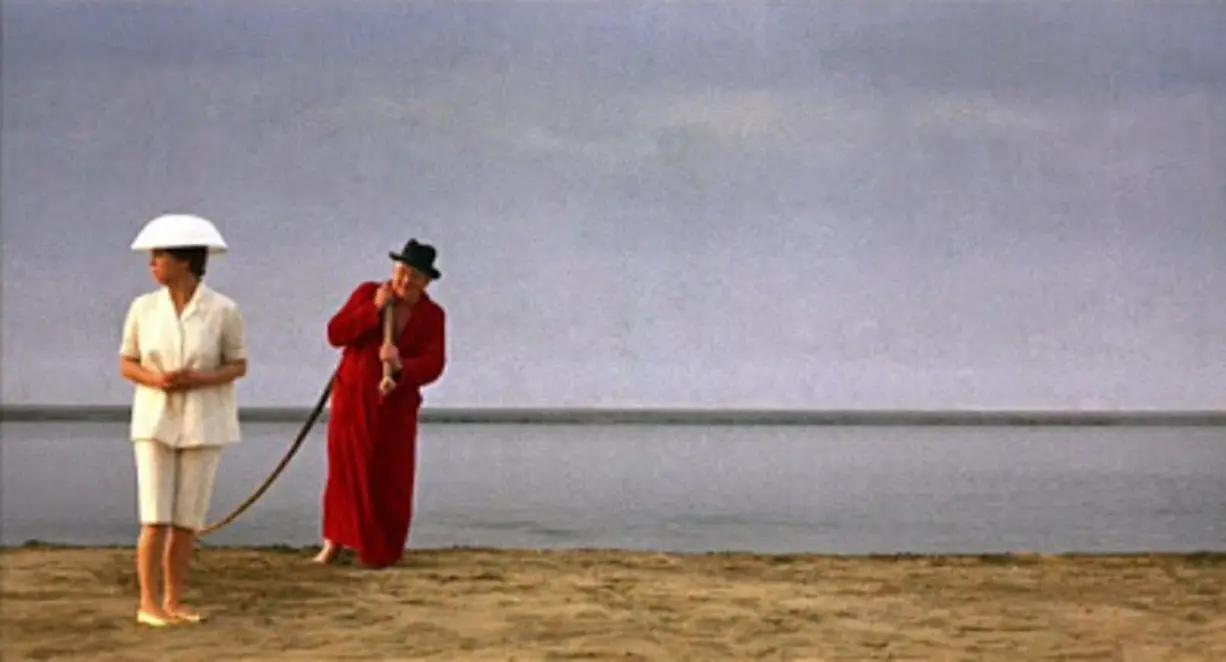
1. The Freaks on the Barge. Early on in the film, Giulietta appears to fall asleep at the beach and is ‘visited’ by a man who emerges from the ocean, pulling a rope. The rope is attached to a barge, and the man gives the rope to Giulietta, telling her ‘the rest is up to you. There are all manner of odd people on the boat, warriors and downtrodden weirdos, and even horses (both living and dead). The appearance of the barge and its passengers is very striking and terrifying (it’s also the point where I realized I was really going to enjoy this movie). Giulietta starts pulling the barge onto the shore before she suddenly collapses on the beach. Is this simply a dream or something more? The image of her grasping at the rope, futilely attempting to pull the boat ashore, seems to be a metaphor of sorts. The boat is all of her turmoil, once hidden, now being brought out into the open as she begins to suspect her husband of having an affair. For many years, she had lived a life of blissful servitude to Giorgio. But now she has been confronted with his unfaithfulness and all of these long-buried emotions and desires were being unearthed. She knows she has to ‘pull the boat out of the water’ and deal with these desires.
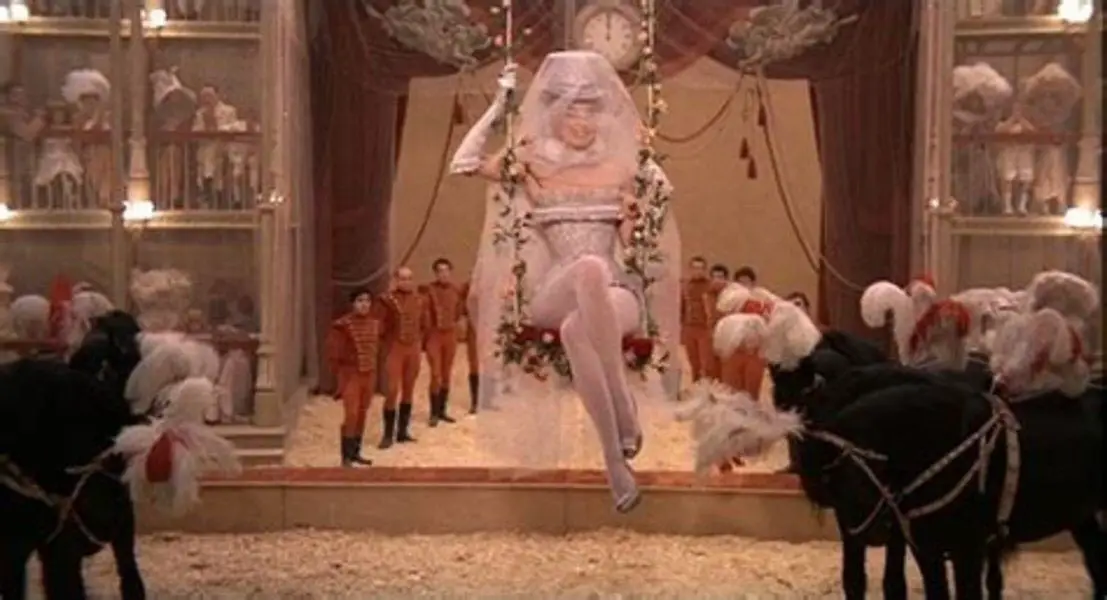
2. Her Grandfather and the Circus Ballerina. Differing from the barge scene, this is a memory that Giulietta recalls in vivid detail (even though she was not present when these actual events occurred). She tells her friend the story of when her grandfather ran out on his family and took off with a ballerina he met at the circus. We are treated to a re-enactment of the circus, a brilliant explosion of color and sound, bright and fanciful. We see her bearded, aloof grandfather and his new, young love board a single-engine ‘circus plane’ for another country. Did you know there was such a thing as a circus plane? Well, in this movie, there is. In another film, this could just be an anecdote but here it is given the full flashback treatment (complete with elephants!). Giulietta is looking back on a family member she greatly admired, someone who committed the scandalous act of deserting his family for an infatuation with a young woman. Giulietta says that when her grandfather returned two years later, happy as ever, he was more or less ostracized by the rest of the family. Could this be her conscience telling her to not to ‘rock the boat’? Her grandfather chased after his passions and paid the price for it. For Giulietta, breaking the mold is not in her nature. She was taught to be a good, obedient wife and that happiness lies in conformity. Still, she seems to linger on the image of her grandfather, for he shows up again in her next vivid memory.
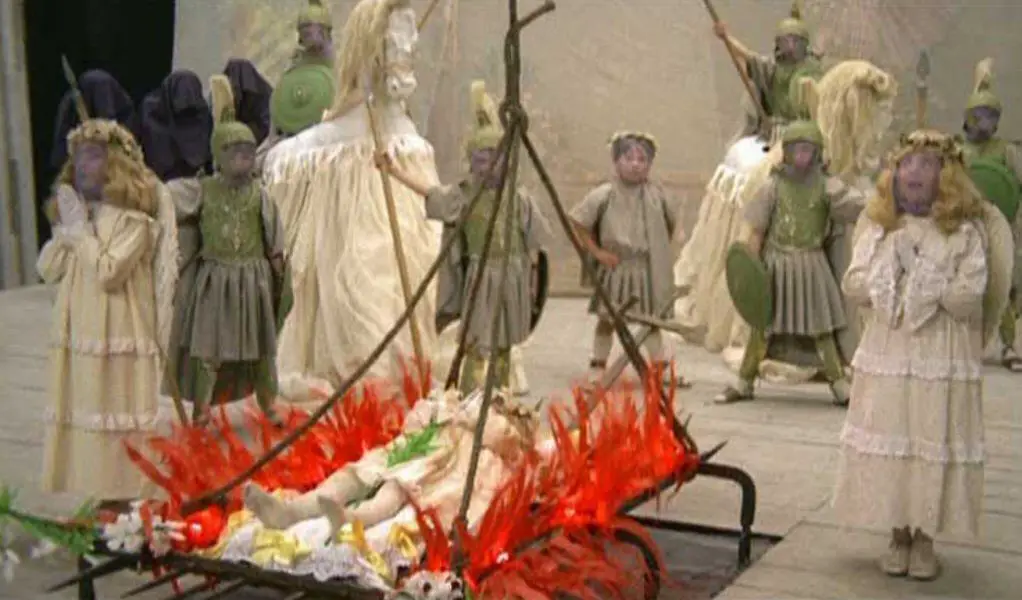
3. The Church Pageant. Another flashback to an incident from her past, this one an event she was actually present for. A young Giulietta has the role of a Christian martyr in a church play. She is strapped to a table with paper mache flames erupting from the sides and is slowly raised up to ‘die’ because she refused to renounce her faith. In the audience of the play is her grandfather, who rushes to the stage and insists that his granddaughter be taken down from the contraption. He causes a scene, calling the play indecent, and asks Giulietta why she would allow herself to be a part of this. He escorts her out of the church, leaving behind a bewildered audience and a furious headmaster. I believe this scene complements the circus vision, illustrating Giulietta’s nature to just follow along with what is expected of her. Once again, her grandfather goes against the grain by setting her free, even though it causes a ruckus with the church. It’s very telling that at the end of the movie, the young Giulietta appears again, still strapped to the flaming table, but this time she is freed by Giulietta herself as she leaves her marriage and her old life behind.
There are other brief images and memories from Giulietta’s past that appear to her: her childhood friend Laura who killed herself over a lost love, her parents meeting Giorgio for the first time, nuns and horses and spillover characters from throughout her life turn up in the unlikeliest places.
The film ends with Giorgio telling Giulietta more lies to cover up his affair. She has proof of his indiscretion but cannot bring herself to confront him with it. He leaves her alone in the house, and that’s when the real fun starts. All of the characters from her visions show up at the same time, nearly suffocating her. But this time there’s resolution: Giulietta frees the younger version of herself from the fiery bed and walks alone into the woods. But is this a happy ending or is it something else? She may have finally accepted her husband’s unfaithfulness and learned to love herself, but ultimately, she is alone. She cannot find solace in Suzy’s world of psychedelic promiscuity; she cannot find answers through mysticism or even through Iris’ advice. Is she going to leave Giorgio or make a change in her life? Is she even going to return from her sojourn into the woods? We are left without answers, just a lot of deep imagery that has lingered in my mind long after the end credits finished.
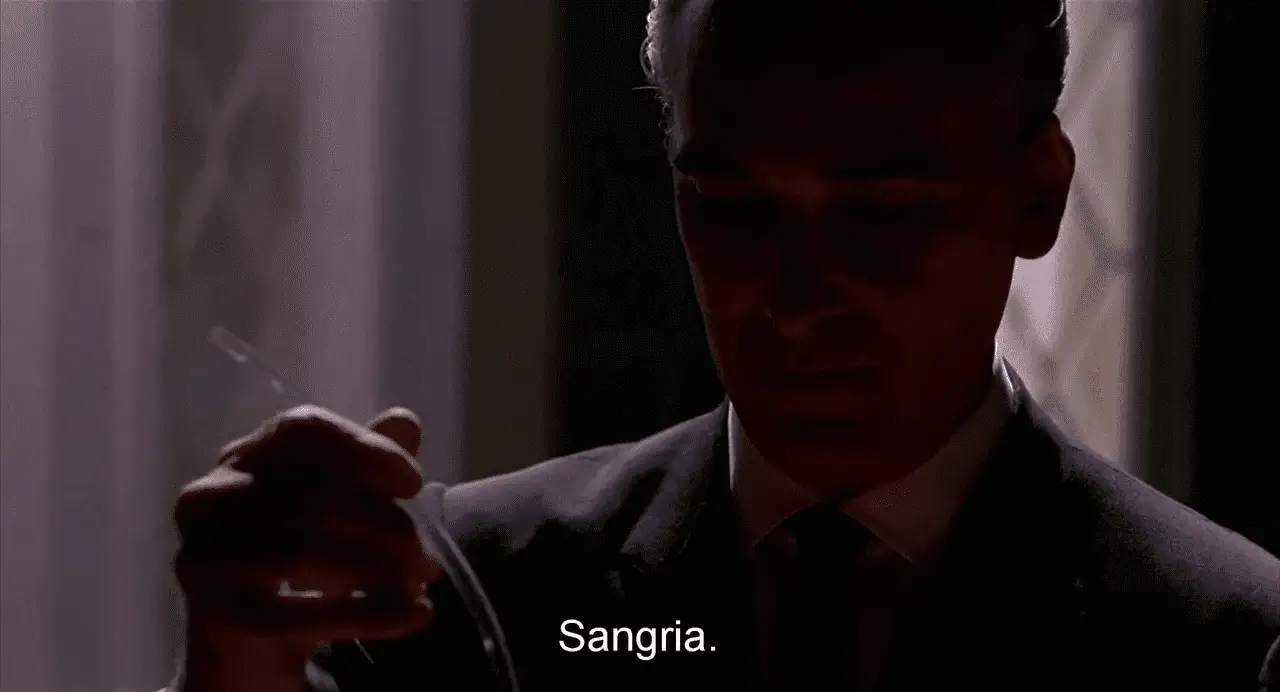
Other things I thought about while watching this movie:
- Fellini ensures that the audience always has something to look at on the screen. The film has the characteristics of a vivid dream and the cinematography is beautiful throughout. You could take stills from this movie and frame them and hang them up in your house as provocative art. It’s obvious that every shot was set up with care: the light and shadows carefully placed on the actors’ faces, the dizzying slide from the bedroom into the swimming pool at Suzy’s house, a brief shot of a man standing shirtless with his mouth open and a cigarette hanging from his lip. It’s directors like Fellini who make most other directors seem like hacks. This movie could even be appreciated with no sound, just as a background barrage of images at a hip party.
- I haven’t seen any other Fellini films to compare this to, but is his dialogue always so unique and quotable? ‘Destiny plays some strange games,’ ‘Water is like a glance that conceals nothing,’ ‘Sangria quenches the thirst of those who drink it. It quenches our secret thirsts, too’. The film is chock full of mysterious little proclamations that linger in your mind long after the scene has ended.
- The private investigators show Giulietta some film they took of her husband sneaking around with his mistress. The reel of film ends and while they are changing to a new reel, they offer to show her slides of her husband cheating on her. ‘For your entertainment while you are waiting, here are some slides of your husband and his beautiful slut. We will soon return to our original programming of the moving pictures of his infidelity’.
- There are so many interesting tangential characters in this film. There’s Giorgio’s suave and mysterious friend Jose who appears out of the shadows one night and teases the possibility of an affair with Giulietta. Suzy’s grandmother who hasn’t slept in five years, which has given her the ability to ‘see all and know all’. The guru known as The Bhisma, who lives in cloud cuckoo land and spouts dubious advice in strange tongues. These characters appear for a scene or even just a brief moment and then they are gone. It’s almost like there are possible main characters for five or six additional movies, just floating around in this one.
- Fellini is counted among the cinema influences of director David Lynch, and the similarities between their work are quite striking. This might have been the most Lynchian film I’ve ever seen that David didn’t direct himself. Things like the framing of the shots, the parade of freaks and weirdos, the use of television to provide a contrast to what’s happening onscreen. Frederico and David share a common muse. They both have a distinct style yet their art is definitely cut from the same cloth. In fact, this film could have had the tagline ‘A Woman In Trouble’ that Lynch used for INLAND EMPIRE, and it would have made perfect sense.
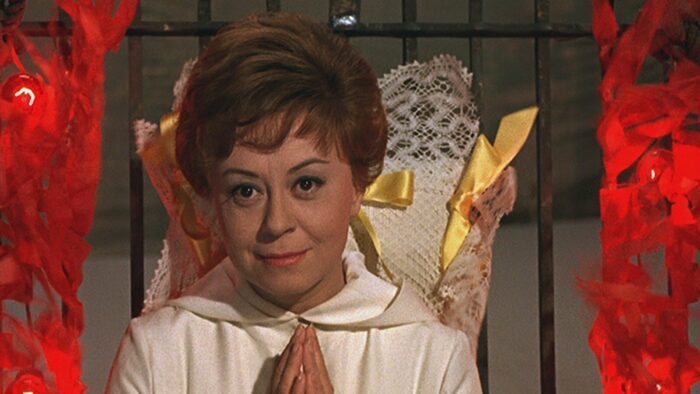
I’m going to go out on a limb and say that this is among the best films I’ve ever seen. There’s just so much to think about, so many beautiful and disturbing images. The tale of a normal housewife has never been told with so much depth and whimsy. I am eager to check out more of Fellini’s work. I have no idea what to expect next, and that’s a telltale sign of a great director.
Juliet of the Spirits is streaming now on The Criterion Channel.




This movie is an amazing masterpiece. Its a waking dream. Love your exceptional review on it. Pay attention to the sound of the wind. Fellini uses this sound in some of his other films.
Satyricon can not be dubbed as the beginning of decline of Fellini because after that he made Amarcord which is one of the best movies you can ever watch in your whole life.
Let’s say that Fellini although he was a real genius and master of his own tools of art he is still a man with ups and downs and we can’t have a judgement of a linear trend to his career whether it’s declining or growing upwards through the years.
Fellini’s earlier films in the neo-realist style are worth seeing too. If you want to see where Martin Scorsese got much of his inspiration from, check out “I Vitelloni”. (Which also arguably birthed “American Graffiti” and the entire youth movie genre).
I’m glad you enjoyed the article! I definitely want to check out 8 1/2. I have to be in just the right mood to enjoy films such as this. Fellini’s films are intense!
Kudos on an engaging and insightful review of this Fellini masterpiece. ‘Juliet of the Spirits’ was the first Fellini film I ever saw (30 years ago as a teenager!) and I was broadsided/mesmerized by its exquisite magic. It has led to a lifelong devotion to Fellini’s overall body of work, and obviously many cinematic explorations—all of them satisfying.
‘Juliet’ was actually highly praised upon release in the late 1960s (Fellini’s first film in color) and nominated for a slew of international awards. It was such a sensory explosion, such a startling panorama for its time, that some critics felt it was self-indulgent, but that was a hasty reaction and since then the work has aged well. It is now truly considered one of “IL Maestro’s” very best masterpieces.
So many of its themes still resonate: decadence in society, sex, and relationships; the inclination to seek fulfillment via trendy self-help/pop psychology movements, exotic gurus, and even the occult; the conflict between staid conformity and contrived eccentricity. Most of all, for me, the film captures the dangers of madness and chaos that lurk behind such acute societal and personal conflicts. When even a simple home life begins to crumble irreparably and society is riddled with confusing messages, how does a sensitive “spirit” react to such severe upheaval? Giulietta is the canary in the coal mine, for Fellini in this film, if you will. She, like Bhisma, could be either a man or a woman. I think Fellini was exploring his own potential for madness, just as much as he was exploring the mind of his female protagonist, here. At all events, it is a bona fide classic. The score by Nino Rota is as haunting as are the images.
If you are planning upon further Fellini exploits, I would recommend beginning with 8 & 1/2—searingly brilliant. La Strada, Nights of Cabiria (both Oscar winners, largely due to Giulietta Masina’s performances) are “must-sees” as well as Amarcord, La Dolce Vita, and Roma. All masterpieces that bring unique things to the table. Satyricon is worth seeing, but that film is truly a self-indulgent mess and should rightly be considered the first mark of Fellini’s general decline, rather than ‘Juliet of the Spirits.’ Enjoy and thanks again for the superb review! Glad I stumbled upon it.